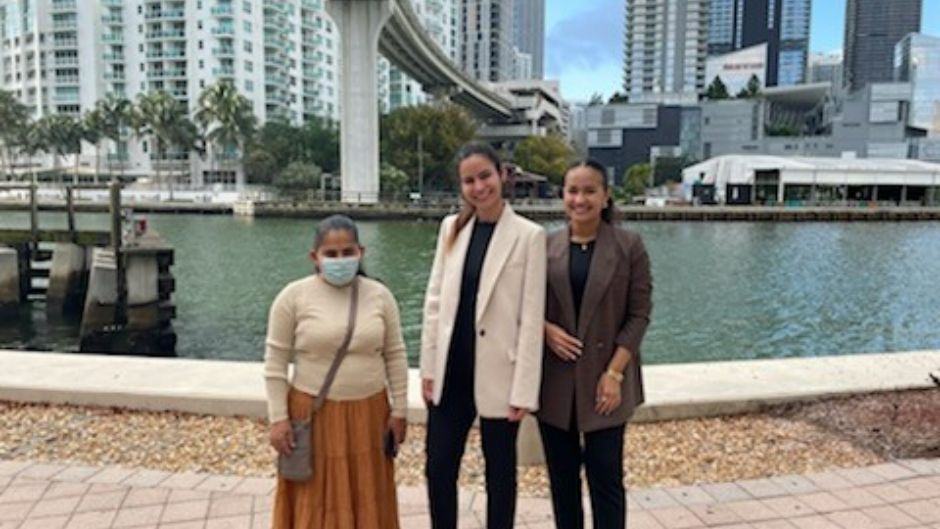In a downtown Miami courtroom where asylum seekers seldom win, Immigration Clinic students successfully represented an Indigenous Honduran woman who fears violence at the hands of the father of her son, a leader of the 18th Street gang in San Pedro Sula. Second-year students Barbara Jimenez and Blanca Alcaraz-Serrano argued that their client merited asylum because her ex-boyfriend sought to assert his perceived superiority over her by raping her. After becoming pregnant, he threatened to kill her if their child was too “dark.”
Asylum seekers, especially those with claims related to domestic violence or gangs, face terrible odds in immigration court. The judge who heard the client’s case, Irene M. Recio, denied 87.6% of asylum cases from 2016 to 2021. The denial rate of Miami judges for that same period ranged from 72.8 to 98.6%.
“The hearing and most importantly, the granting of asylum, will forever be the most rewarding experience I have had in law school,” said Jimenez. “I feel so incredibly happy to see that our client will finally be able to live without fear and reunite with her children. It was truly a privilege to meet our client and represent her. She and her case will forever hold a special place in my heart.”
Alcarez-Serrano and Jimenez began the preparation of the case by conducting countless interviews with their client and her family members to understand their client’s story and prepare her to testify in court. The students also researched legal issues, wrote pretrial memoranda of law, prepared country conditions reports, and obtained two expert witnesses. Before the hearing, the students prepared their client and two experts to give testimony and withstand cross-examination by the attorney representing Immigration and Customs Enforcement.
The hearing lasted over five hours, including three hours of direct and cross-examination of the students’ client. At the conclusion of the hearing, the judge explained her favorable decision and offered feedback to the students.
“As an asylee myself my heart is filled with overwhelming joy after this experience,” said Alcaraz-Serrano. “My father came seeking asylum in this same courthouse 24 years ago and our lives were forever changed after that day, so I know that this grant of asylum marks a new beginning for our client and her family who can now live free of fear. I am incredibly grateful and honored to be a part of this experience, and I will carry this with me for the rest of my life.”
The students’ client has been in the United States for seven years, separated from two of her children, who remain in Honduras. The win in court gives her the right to stay here as an asylee and a path toward citizenship, allowing her children to reunite with her in the United States.
Addressing the students, the clinic’s client said, “I am so happy and content. I have so much to say. I feel so safe. I feel so proud to have had you all as my advocates. I feel so proud to have met you all and thankful that you represented me. I hope you all win every case you take on! I want you to tell others not to give up, I want you all to motivate them as you motivated me. This feels like a dream come true.”
Romy Lerner, former associate director of the immigration clinic, supervised the students. Lerner recently left the clinic to become an immigration judge.
Read more about the Immigration Clinic.

